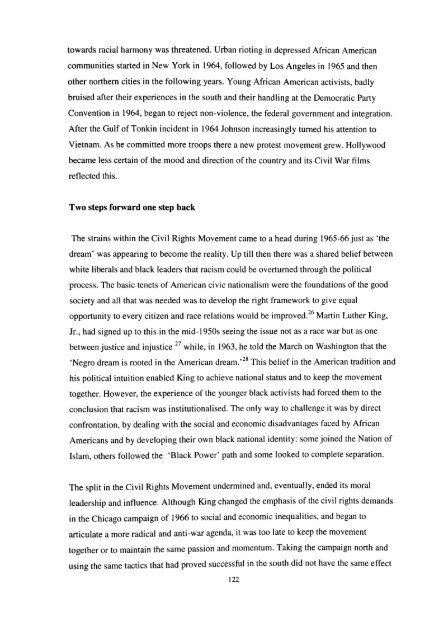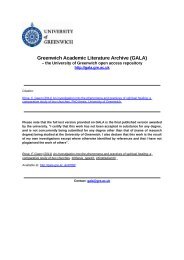Download (3483kB) - Greenwich Academic Literature Archive ...
Download (3483kB) - Greenwich Academic Literature Archive ...
Download (3483kB) - Greenwich Academic Literature Archive ...
- No tags were found...
Create successful ePaper yourself
Turn your PDF publications into a flip-book with our unique Google optimized e-Paper software.
towards racial harmony was threatened. Urban rioting in depressed African Americancommunities started in New York in 1964, followed by Los Angeles in 1965 and thenother northern cities in the following years. Young African American activists, badlybruised after their experiences in the south and their handling at the Democratic PartyConvention in 1964, began to reject non-violence, the federal government and integration.After the Gulf of Tonkin incident in 1964 Johnson increasingly turned his attention toVietnam. As he committed more troops there a new protest movement grew. Hollywoodbecame less certain of the mood and direction of the country and its Civil War filmsreflected this.The strains within the Civil Rights Movement came to a head during 1965-66 just as 'thedream' was appearing to become the reality. Up till then there was a shared belief betweenwhite liberals and black leaders that racism could be overturned through the politicalprocess. The basic tenets of American civic nationalism were the foundations of the goodsociety and all that was needed was to develop the right framework to give equalopportunity to every citizen and race relations would be improved. 26 Martin Luther King,Jr., had signed up to this in the mid-1950s seeing the issue not as a race war but as onebetween justice and injustice 27 while, in 1963, he told the March on Washington that the'Negro dream is rooted in the American dream.' 28 This belief in the American tradition andhis political intuition enabled King to achieve national status and to keep the movementtogether. However, the experience of the younger black activists had forced them to theconclusion that racism was institutionalised. The only way to challenge it was by directconfrontation, by dealing with the social and economic disadvantages faced by AfricanAmericans and by developing their own black national identity: some joined the Nation ofIslam, others followed the 'Black Power' path and some looked to complete separation.The split in the Civil Rights Movement undermined and, eventually, ended its moralleadership and influence. Although King changed the emphasis of the civil rights demandsin the Chicago campaign of 1966 to social and economic inequalities, and began toarticulate a more radical and anti-war agenda, it was too late to keep the movementtogether or to maintain the same passion and momentum. Taking the campaign north andusing the same tactics that had proved successful in the south did not have the same effect122
















